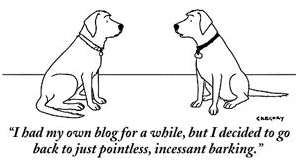
Click on
Library Icon
to learn more
|
Introduction
Dogs often get attention by whining, pawing, jumping
on us and other unruly behaviors. If dogs get
attention for jumping on you once, they will jump again
and again. Dogs repeat behaviors that work. Canines
are companion animals that value attention. Just like gamblers in Las Vegas
value money and will pull the slot again and again
hoping for a jackpot, dogs
repeat behaviors persistently for intermittent
rewards.
If
you don't want your dog to get your attention by whining, jumping
up, pawing
at you, stealing objects, rattling doors or food
bowls, then be SURE your dog
does NOT get any type of attention or reward for
doing what you do NOT want.
Be
fair to your dog! Make sure you teach your dog
how to earn your
love and
praise for the behaviors you DO want.
Unintentional reinforcement
of excess
whining
Once you have determined there
is no valid reason for whining
(that is, the dog is not in
pain, danger, or needing to
eliminate), the whining should
be passively ignored. Don't let
the whining "work" to get the
dog what he/she wants.
Take two
dog bones and call me in the
morning
If your dog keeps you up at
night and you have tried
ignoring the dog for whining or
whimpering, you may need to try
a different tactic. You may need
to correct the dog with a stern
voice to interrupt the behavior,
and then praise the dog for a
positive response. Your dog may
be confused and not learn from
this if you are not teaching
daily with clear methods to get
your dog in the habit of
learning from you and by doing
so have also gained your dog's
respect.
|
The goal for preventing
attention-seeking behaviors
is to give the dog MORE
attention for the behaviors
you DO want and NO attention
for behaviors you do NOT
want. |
Teach
the dog, "Quiet", then praise,
"Good Quiet"
If the dog is whining and keeping you up at night,
does not need to eliminate,
and ignoring the behavior has not worked, then, tell
the dog, "Quiet" in a stern voice. If the dog
stops the vocalization, count to 3 seconds, and
begin praising the dog by saying, "Good quiet" in a
soothing, loving voice.
Wait about five to seven seconds
more and praise the dog again for being quiet. The
goal is to increase the number of seconds between
your praise. Wait ten to fifteen seconds more, then
repeat, "Good quiet." Then, after about thirty
seconds, again say, "That's a good quiet." If
the dog repeats the process (e.g. 10 minutes later),
then follow the four steps below to increase the
consequences. Consider putting a rawhide chew in the
kennel to give your dog a positive activity to do.
Increase exercise during the day. Feed your dog an
hour before bed and take out to eliminate right
before bedtime.
|
No attention is usually
more effective than negative
attention!
Always praise behaviors
you want to increase. |
Prevent Attention Seeking
- Try to
praise your dog when your dog least expects it, "You
are being such a good dog."
- Make good
things happen when your dog is NOT seeking your
attention.
- Try to initiate play, toys and treats
ONLY when the dog is quiet.
Your dog needs to
connect good behavior with your attention.

If your dog is NOT displaying attention-seeking behavior, you can
let the good times roll!
|